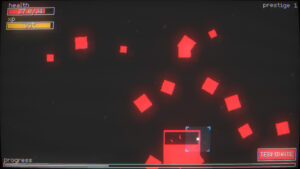Nodebuster
 Here’s a recent game that I happened across in a list of recent games written in Godot. I bought it on a whim because it was cheap, and reasonably short, and it put me in mind of the sorts of weird little indie experiments I used to post about a lot here.
Here’s a recent game that I happened across in a list of recent games written in Godot. I bought it on a whim because it was cheap, and reasonably short, and it put me in mind of the sorts of weird little indie experiments I used to post about a lot here.
At first, it presents itself as an abstract shooter. Colored squares and other shapes drift across the screen at random, somehow damaging you, and you wave around a reticle to deal damage to them in return. Notably, shooting is automatic, in regular pulses; there’s a square area-of-effect marked around your reticle, and everything that overlaps with that square when the pulse comes gets hit. It gives the shooting an unusual feel — it’s entirely possible to target an object and not damage it because you didn’t wait for the pulse before moving away. Destroyed objects leave behind resources, which you swipe over with the reticle to collect, then spend on upgrades. Picking upgrades is the core of the game’s strategy; shooting stuff is a trivial matter when you have the right upgrades.
Some things about the upgrades really reminded me of the sort of upgrades you get in idle games. The gradual but ultimately exponential escalation of power. The increasing automation of trivial tasks. Even just the appearance and layout of the upgrade menu, which reminded me a lot of the ascension bonus menu in Cookie Clicker. But of course this isn’t an idle game. The gameplay is active. You have to keep targeting things, you have to keep sweeping up the crumbs, you have to keep re-entering the arena after dying. It’s a game that pulls ideas from the idle game genre, without being one.
For most of its duration, anyway. As you max out the upgrades, you eventually get to a point where your area of effect is a large portion of the screen, multiple automated drones are shooting things on your behalf, resources are collected automatically within a significant radius, and you’re healing damage faster than it’s being inflicted. At this point, you no longer really need to move at all, and the assault only ends when you tell it to end. It has evolved into an idle game by sheer force of power creep. I’ve seen plenty of games where leveling up excessively destroys the challenge, but it’s unusual to see it done so deliberately, and within the span of just a few hours of play.
 Comments(3)
Comments(3)
I often contend that games with too much reliance on a power progression system end up as essentially obfuscated idle games. I feel this way more and more often lately, and it’s ended up giving me a generalized aversion to progression systems and any sort of “number go up” loop.
Not that there’s anything wrong with playing an idle game, I just am not usually in the mood for one, especially not ones that pretend to be something else.
This makes me curious if you’ve played Vampire Survivors? I’m pretty sure that’s the originator of this sub-genre of “idle games where you have a relatively sedate but still necessary amount of moving around to do, until the power creep kicks in”
I had not played Vampire Survivors when posting this, but fortuitously, Steam has it on sale just now, so I’ve given it a try. I note with interest that it uses the same pulse-based automatic firing as Nodebuster, so perhaps that’s another mark of the genre you’re describing.